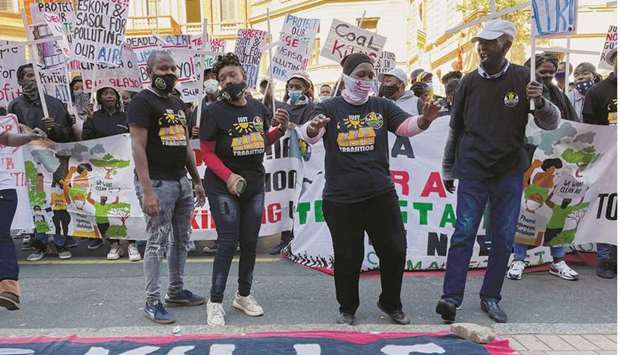South Africa’s failure to tackle toxic levels of air pollution produced by burning coal is a violation its post-apartheid constitution, activists and a UN rights expert said in court yesterday.
Campaigners are suing the South African government in the High Court, hoping to force tougher action against heavy polluters such as state power company Eskom and liquid fuel producer Sasol.
The campaigners say tougher action is required to enforce a constitutional guarantee of the right to an environment not harmful to health.
Environment Minister Barbara Creecy acknowledges that air pollution is a problem, but her submission to the court says the constitution does not require the ministry to impose stiffer rules.
Using the constitution to try to force the minister’s hand violates the separation of powers, she argues.
The ministry says that environmental concerns conflict with economic considerations: the need to generate power, nearly 90% of which comes from coal, but also jobs in a coal belt with high poverty rates.
A spokesman for the Department of Environmental Affairs said he could not comment while the matter was before the court.
The hearing is virtual, but a few dozen singing activists gathered outside the High Court in the capital Pretoria to protest against the coal industry, waving banners with slogans such as “coal kills” and “united against deadly air”.
“We’re asking for accountability from government for its failure so far to...implement its own plan. We view the levels of unsafe air pollution as a public health crisis,” Tim Lloyd, lawyer for the Centre for Environmental Rights, told Reuters in a videocall.
A 2012 South African government plan set goals to address air pollution in the Highveld. Representatives of Eskom and Sasol had yet to respond to requests for comment sent on Friday.
Activist groups including Groundwork say there are “dangerous levels of air pollution” in the Highveld Priority Area, which comprises parts of Gauteng, the province in and around Johannesburg, and Mpumalanga, where coal is mined and burned to generate electricity.
The activists’ submission to the court cites a South African Air Quality Management Systems report covering 2015 to 2018. The report shows that air quality at monitoring stations in the Highveld exceeded the lower of the World Health Organisation’s (WHO) guideline for smaller particulate matter on most days and its guideline for bigger particulates on more than half of the days monitored.

Protesters gather outside court as a case gets underway concerning South Africa’s failure to tackle toxic levels of air pollution produced by burning coal, in Pretoria, yesterday.
